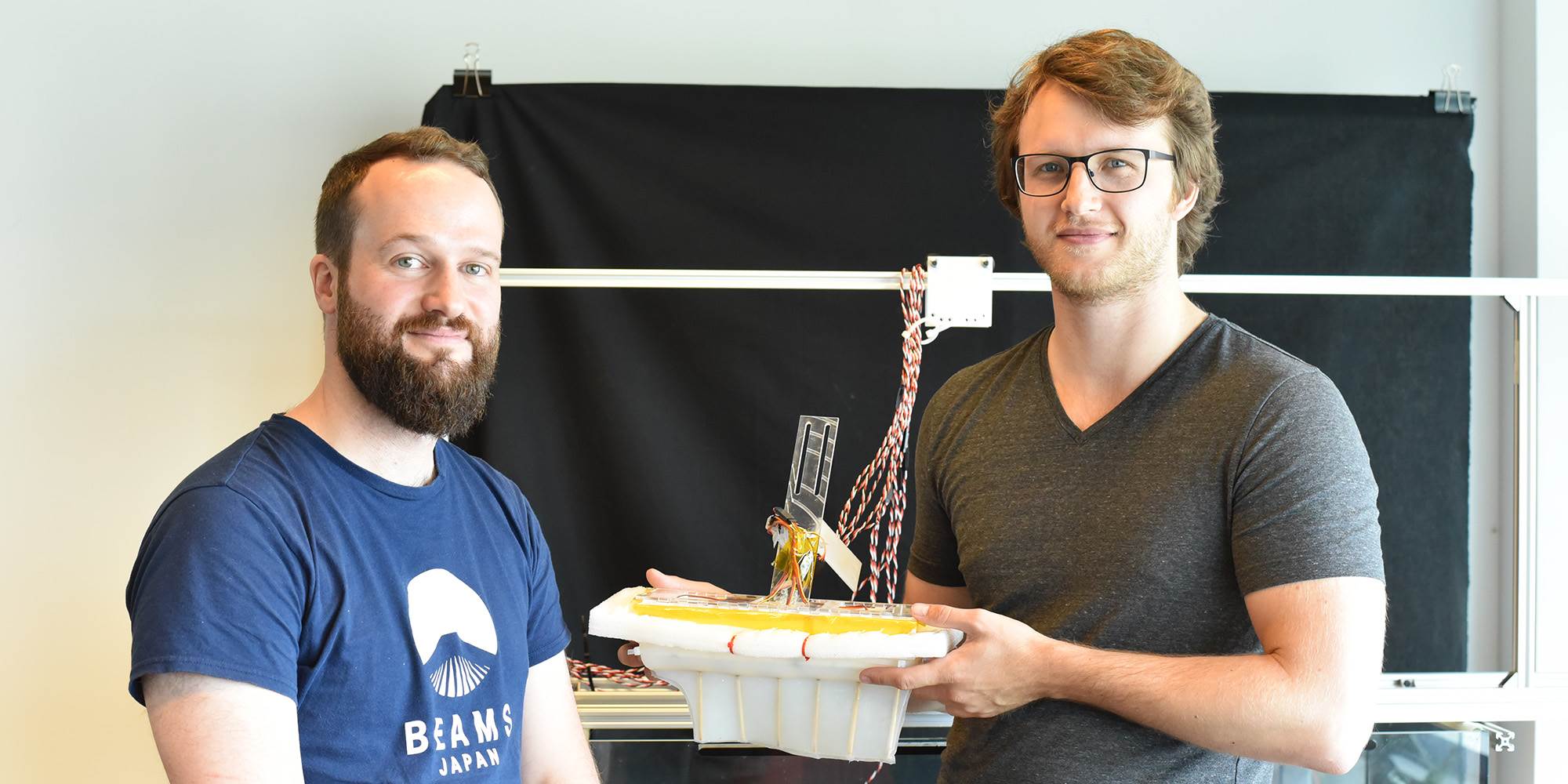Robotic fish teaches itself to swim
Inspired by the black ghost knifefish, two researchers from the IT University of Copenhagen have developed a soft robot that taught itself to swim. By means of an evolutionary algorithm, the artificial fish has discovered a swimming technique resembling that which the knife fish developed through natural evolution.
Digital Design DepartmentResearchrobotsartificial intelligence
Written 15 August, 2018 09:50 by Vibeke Arildsen
Soft robots made from materials like silicone are considered to have great potential – not least because they are safer for humans to interact with than traditional metal robots. However, soft robots are harder to control since their movements are difficult to calculate.
"With traditional robots, you can develop the controls using computer simulations, but it's hard to simulate robots made of soft materials because their movements are so complex, especially in water," says Jonas Jørgensen, a PhD student at ITU.
With Frank Veenstra, who just finished his PhD at ITU, he decided to investigate whether a robot can teach itself to swim, saving humans the trouble of manually programming its movements.
Inspiration from exotic fish
Their swimming robot is made from silicone and is inspired by the exotic black ghost knifefish, a fish that swims on the water surface by using an undulating fin underneath its body.
 Jonas Jørgensen og Frank Veenstra with the swimming robot.The researchers implemented an evolutionary algorithm to make the robot propel forward in the water as quickly as possible.
Jonas Jørgensen og Frank Veenstra with the swimming robot.The researchers implemented an evolutionary algorithm to make the robot propel forward in the water as quickly as possible.
"The only input we have given to the robot is that it should find the best and fastest way to move forward by experimenting with moving the fin in different ways and at different speeds," says Frank Veenstra.
In this way, the robot discovered far more effective swimming techniques than those programmed manually by the two researchers. In fact, the robot swam more than twice as fast using a technique it had developed itself.
A step forward for soft robots
At its best, the robot reached a speed of 8 centimeters per second. The point of the project was not to achieve high speeds, however. Rather the purpose was to demonstrate that evolutionary algorithms are more effective than hand-programmed commands, says Jonas Jørgensen, who believes that this type of algorithm could increase the potential of soft robots.
"It is extremely useful if we can make the robots teach themselves to perform specific tasks by experimenting in the environment they are going to navigate in," he says.
"The method we used can be generalized, so evolutionary algorithms could be a way to discover the most optimal behaviour of other types of soft robots as well, also on land."
Similar to naturally evolved technique
Another purpose of the project was to investigate whether the evolutionary algorithm would come up with a swimming technique similar to that of the real ghost knifefish. This indeed turned out to be the case.
It is interesting that we can develop a robot inspired by a real organism and find that the robot finds a swimming technique similar to that which the fish has developed through natural evolution.
Jonas Jørgensen, PhD student
"It is interesting that we can develop a robot inspired by a real organism and find that the robot finds a swimming technique similar to that which the fish has developed through natural evolution. This could indicate that the algorithm has found the most efficient swimming technique for this specific type of body, which has also prevailed in nature," says Jonas Jørgensen.
Useful for underwater expeditions
So far, the researchers have only worked on making the robot swim forward, but eventually, evolutionary algorithms could also be used to develop techniques for turning and diving, the two researchers believe.
As researchers become able to control swimming robots more accurately, these will become more and more useful in the real world.
"Swimming robots are useful for many purposes. In underwater expeditions, fish-like robots disturb the fish less than humans would. They could also be helpful for mapping the environmental impact of environmental disasters," says Jonas Jørgensen.
Vibeke Arildsen, Press Officer, phone 2555 0447, email viar@itu.dk